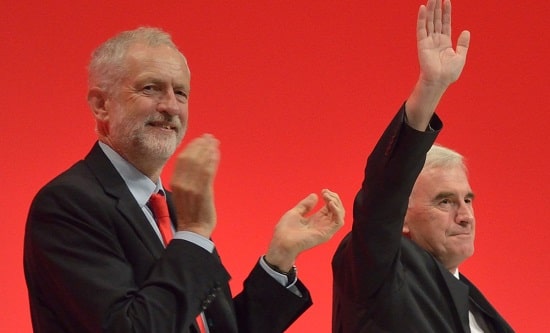
The 2019 Labour conference was dominated as expected by Brexit and the deep divisions it has created within the party. Try as Labour could to showcase new policies – on economics, the NHS and the Green New Deal, it was Brexit that mattered to the media. In the end the fissures could only be papered over: Labour under Jeremy Corbyn limps on, behind the Tories in opinion polls by anything between 2% and 15%. Robert Clough reports.
Would conference adopt a Remain policy? Would it call for a referendum before or after a general election? Labour leaders engaged in a war of manoeuvre: Labour deputy leader Tom Watson demanded that Labour become a Remain party and hold a referendum before a general election. In retaliation, allies of Corbyn tried and failed to get the National Executive Committee (NEC) to abolish the deputy leader post. Corbyn then attempted to get the NEC to shut down discussion of Brexit to prevent the adoption of a pro-Remain position. Corbyn’s Head of Policy and close adviser, the pro-Remain Andrew Fisher, resigned complaining about ‘a lack of professionalism, competence and human decency’ in Corbyn’s team – presumably a shot at pro-Brexit Seumas Milne who is Corbyn’s Director of Strategy.
This was all meat for the media but distracted attention from a consideration of whether Labour has really changed under Corbyn – he has now been leader for four years. However, his promises of a massive campaign against austerity proved empty: as we said at the time ‘Corbyn will have to decide which is more important: building a movement against austerity or preserving the unity of the Labour Party. The two cannot be reconciled’ (FRFI 247, October/November 2015). Within months of his election, he and Shadow Chancellor John McDonnell had co-signed a letter instructing Labour-run councils to set legal budgets which meant inevitably continuing the cuts demanded by the Tory government. The following year (2016) the Labour conference passed an amendment to its constitution which made voting for or abstaining on an illegal budget a potentially disciplinary offence.
We also recognised that ‘appeals to maintain Labour unity will involve making concessions to reactionary forces’ (ibid). That has been the story of Corbyn’s leadership. He has constantly compromised with the right wing of the Parliamentary Labour Party: over a vote on military intervention within Syria, over anti-Semitism, let alone over austerity. Labour supporters will point to new conference policy supporting the international Boycott, Divestment and Sanctions campaign as proof of progress. But this comes in the wake of two Labour-run councils (Newcastle and Tower Hamlets) banning pro-Palestine events from their premises presumably claiming that they could be deemed anti-Semitic under the IHRA definition. And when Corbyn denounced a cartoon by Carlos Latuff displayed outside the conference as anti-Semitic and demanded its removal by the police even after they had decided that it presented no offence, we can see how the practice is going to be different from the fine words.
Four years have seen no new policy on benefits, no alternative to the punitive Universal Credit (UC) system. Once again, all that Shadow Secretary for Work and Pensions Margaret Greenwood could offer is a pause in UC roll-out with some reforms such as an end to the benefit sanctions regime, and some window dressing such as the provision of advisers to enable those on benefits to obtain what they are entitled to. Labour’s electoral problems with state welfare have not gone away: MPs, many now in Brexit-voting constituencies, blamed Labour’s losses at the 2010 and 2015 election on the perception that it was soft on benefit claimants. It is clear that Labour intends to continue the roll-out of UC when it can claim that its problems have been removed – an impossible pledge.
Apart from Brexit, most media attention was focused on economic and climate change policy. There are of course proposed reforms which are essential to obtain electoral support – a commitment to abolish the anti-trade union laws, restore collective bargaining, and end the opt-out of the European Time Directive. But there are policies which require a real movement if they are to happen – a pledge to provide £6bn to fund a new National Care Service which would deliver free care to those who require it. What is promised falls far short of the nearly £8bn Shadow Chancellor John McDonnell acknowledges has been removed from local authority adult social care budgets since 2010.
Apart from that, McDonnell’s headline policies exist only in fantasy: reducing the working week to 32 hours without loss of pay within ten years, pledging ‘£250bn of green government investment in a National Transformation Fund. And £250bn more of lending through our National Investment Bank.’ There is no recognition of a deepening world crisis and the vulnerability of British imperialism to sudden financial shocks especially following Brexit, no-deal or otherwise. He did not address the dominance of the finance sector and the City of London – his past enthusiasm for curbing their excesses seems to have withered away. Lastly there is a neat touch of social chauvinism when he pledges ‘we will provide to the citizens of the Global South free or cheap access to the green technologies developed as part of our Green Industrial Revolution’. That is, after our mining and agribusiness companies have looted their resources to enable this great Revolution.
In truth much of this may not find its way into Labour’s election manifesto. Shadow Home Secretary Diane Abbott for instance was quite clear in an interview with BBC Radio 4 that it was all very well conference agreeing a motion supporting the freedom of movement, but Labour would still stand on the need for a work visa system – in other words, it will maintain a system of racist immigration controls. The more things Labour appears to change, the more it stays the same – a party fit for imperialism.
Fight Racism! Fight Imperialism! No 272, October/November 2019




